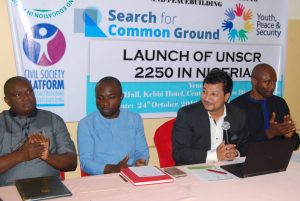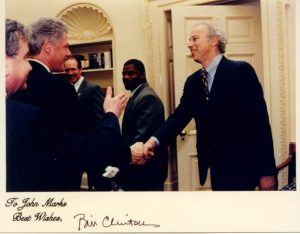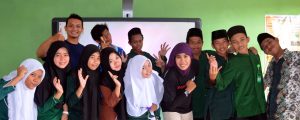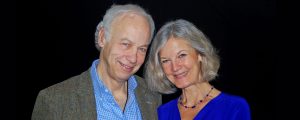‘Search’ Celebrates 35 Years of Peacebuilding
 Search for Common Ground aka Search, the Washington based global peacebuilding non-governmental organisation, (NGO) clocked 35 years today and rolled out the drums, so to say. In Abuja, Nigeria, they did not only invite friends of SFCG to a drink, they also released a book accounting for the past 35 years of their existence, (1982-2017). Search Celebrates 35 Years of Uncommon Courage is a very interesting book in many ways. The pictures and graphics that fill the book means it requires very little beyond minimum visual literacy to grasp the message. The substantive issue would be the SFCG approach to healing of fissures on a worldwide scale, particularly between the Western and the Muslim world.
Search for Common Ground aka Search, the Washington based global peacebuilding non-governmental organisation, (NGO) clocked 35 years today and rolled out the drums, so to say. In Abuja, Nigeria, they did not only invite friends of SFCG to a drink, they also released a book accounting for the past 35 years of their existence, (1982-2017). Search Celebrates 35 Years of Uncommon Courage is a very interesting book in many ways. The pictures and graphics that fill the book means it requires very little beyond minimum visual literacy to grasp the message. The substantive issue would be the SFCG approach to healing of fissures on a worldwide scale, particularly between the Western and the Muslim world.
At a time political realists were experimenting with human beings, developing models of winning nuclear wars or overwhelming coercive power to subdue the enemy, John Marks, the founder, stepped out to centralise the paradigm of ‘common ground’ between conflict parties. Although this book calls it a problem-solving approach, that move is actually a problematising approach which challenges opponents to see the problem in terms of how they construct it rather than something natural or inevitable. Believing that people construct their world inter-subjectively, the possibility of a common ground could be contemplated. This contrasts with the mechanical attitude in problem solving approach that takes a problem on the face value. What could thus be said to set SFCG apart in any ways must be this mindset and, by implication, an anti-war ideological commitment at a time when the Cold War was still raging.

Founder John Marks in a handshake with Bill Clinton on his return from a US-Iran football match for peace years back
It is both an individual and collective accomplishment that SFCG can claim for itself now as being the world’s largest peacebuilding INGO now, operating from Washington DC and Brussels, the cornerstone cities of the contemporary Western world. In this book spanning 32 pages, SFCG tells its own story through crisp reminiscences where heroes and heroines capture the miraculous, the soul destroying and the plain dramatic that characterise the world of managing conflict and building peace across Africa, Asia, Europe, Middle East and the United States. It does this across many tools stretching from radio broadcasts to football or wrestling matches, talking to police, local journalists, community leaders and just about any such group or action that creates space for narrowing differences and distance between opponents towards a common ground, be it in Rwanda, Burundi, Nigeria, Morocco, Central African Republic, Yemen, Sri Lanka, Madagascar, Kyrgyzstan, Colombo, Dar Es Salaam, Palestinian Territory, Niger Republic, Pakistan, Angola, Zimbabwe, Chad, Ethiopia, Indonesia, Kenya, Nepal, Ukraine and so on.

SFCG in Indonesia

John and Susan Marks, the founders
It could be seen how each contributor deposits a crucial nugget of reality in his or her narrative. There is no alternative to reading the book to encounter them all. It is only possible and perhaps apt to conclude the review by randomly picking a line or two from a few of them to give potential readers an idea of what is in stock. It won’t be a bad idea to start from Charline Burton’s “To share views and listen to stories of exceptional courage and resilience from citizens of conflict – affected areas who’ve had to rebuild everything not once, not twice but often half a dozen times”. Burton, the West Africa Regional Programme Manager is most likely to be able to capture so much because she has served in Goma in DRC, the training for transition to adulthood. Sankini Da Silva talks of “wonderful legacy that continues to inspire us, the unbound optimism in our continued effort in shaping and enriching the lives of countless people”. She too must have seen a lot, in serving in Colombo.
Writing from a relatively more peaceful Tanzania, Spes Manirakiza speaks of “an organisation which provides a great place to challenge many things”. Following that trajectory are two staff from Nigeria. While for Maimuna Aboki, “Search personifies peacebuilding”, it is for Ene Ede a case of “at 35, Search is influencing the world more than older organisations”. Finally, Lena Slachmuijlder from Washington asserts that “the world needs each and every one of us more than ever. With passion, empathy and love, let us forever honour the chance we have to serve this mission”.
Shamil Idriss, the President and CEO is right to a great extent in saying that the mega institutions for managing conflict have found themselves challenged at it and citizenship led peace delivery processes is no longer a luxury. This is more so across Africa where ‘instrumentalisation of disorder’ has been forcefully made a part of statecraft. Unfortunately, the book cover was not immediately available for display here.



























